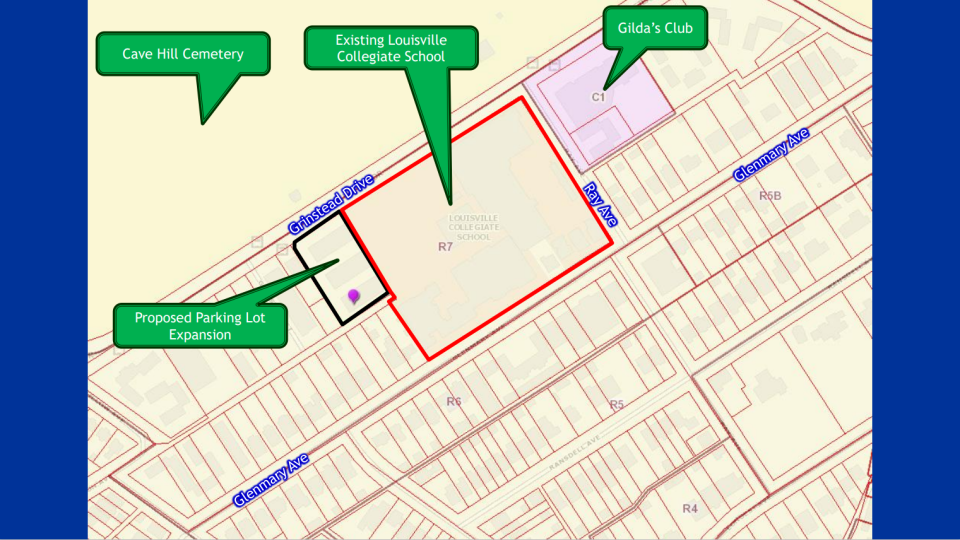Housing versus parking: Collegiate shows Louisville how much it devalues social justice
I am a graduate of the Louisville Collegiate School. In addition to receiving an excellent education, which helped propel me to a career as a physician I made life-long friends who I maintain close contact with to this day. There are exceptional students who work very hard and go on to achieve great success; however, there is also a privilege that many at this school do not realize they have, which is why my father, also a doctor, and I are writing this opinion piece.
With great sadness we read recently that Collegiate wants to destroy an affordable housing complex to build a parking lot for its students. As clinicians who serve some of the most vulnerable populations in the United States and who witness first-hand the health benefits affordable housing has on a community as well as the negative toll housing insecurity has on a person’s condition this is something that does not sit right with us.

More:Louisville Collegiate School plan to tear down nearby apartments has residents up in arms
Because of contact with patients, we fully understand the effects societal constructs such as racism, gender inequality, poverty and governmental policies have that influence who gets sick and who has access to care. Structural violence was a phrase first used in the 60’s to describe the societal arrangements that block people from achieving their potential. It is completely unnecessary, damages human growth and reduces the probability an individual can meet their basic needs. By kicking people out of their homes, Collegiate is actively participating in structural violence whether they are aware of it or not.
My father practices medicine for the homeless on East Muhammad Ali Boulevard, one mile from the Collegiate Campus. It may has well be another world. Homelessness worsens patient’s chronic diseases. This summer, one patient who lived out of their car could not properly refrigerate their insulin. The heat damaged the medication, and they presented in Diabetic Ketoacidosis, which is a medical emergency that can lead to death if not appropriately treated.
On a population level I often find myself at odds with the “Collegiates of our nation” as I think of them. These are private equity firms amplifying care gaps, government entities slashing women’s reproductive rights and healthcare organizations reducing people to a set of numbers. I use much of the skills I learned at Collegiate such as network building, cultivating team-based performance and fostering a culture of caring to optimize clinical outcomes and combat these negative externalities.
Regrettably, Collegiate is not focused on diversity, equity and inclusion and devalues social justice. The history of Louisville is littered with discrimination. Racist infrastructure, redlining and urban renewal remain pervasive throughout. More recently, the murder of Breonna Taylor, in her own home at the hands of three Louisville police officers shined a national spotlight on these existing issues. Collegiate woefully fails to realize how an advantaged establishment such as itself oppressing defenseless citizens fits into the larger historical context and record of prejudice in this city.
More:'You see people's lives transform': What it's like inside Louisville's safe outdoor space
One of the reasons you attend Collegiate is the opportunity to develop strong personal and professional relationships. Collegiate boasts an alumni-network that includes prominent lawyers, doctors, financiers, entrepreneurs and a lot of families with an abundance of social capital and accumulated assets through consolidation of generational-wealth. Unquestionably, Collegiate could organize some of these individuals and local community leaders to create a just solution for all.
At its best Collegiate leverages its strong academic standards, brilliant faculty and professional contacts to produce highly motivated, intelligent and thoughtful individuals who make a positive impact on the world. At its worst Collegiate further exacerbates existing disparities, reinforces prejudices and both actively and tacitly promotes structural violence towards those most at risk.
Affordable housing is a human right. We hope this op-ed creates a productive discussion among Collegiate administrators, local community members, and all stakeholders currently striving for a more just and equitable society so that everyone can fully achieve their potential.
Robert Wojda is a graduate of the Medical University of Warsaw. He came to the University of Louisville in 1985 and completed his medical residency in Family Medicine where he served as chief-resident. More recently, he has taken a clinical role at the Family Health Centers located on East Muhammad Ali Boulevard where he currently sees patients and serves as a patient advocate for those most at need.
Thomas Wojda was born and raised in Louisville, Kentucky and attended The Collegiate School. He also graduated from the Medical University of Warsaw. Currently, he is an Assistant Professor of Family Medicine at the University of Pittsburgh Medical Center, an active Primary Care and Sports Medicine physician, and a Fellow at the American College of Academic International Medicine.
This article originally appeared on Louisville Courier Journal: How Louisville Collegiate further exacerbates existing disparities

